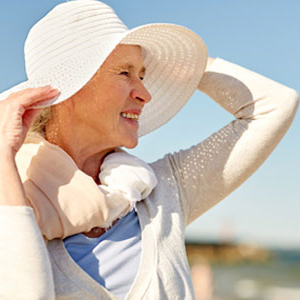 It’s a fact that as we age, we are more susceptible to heat-related illnesses and injuries. We are less efficient at controlling body temperature because we sweat less than our younger counterparts, so our heat-regulating system isn’t as efficient as it used to be.
It’s a fact that as we age, we are more susceptible to heat-related illnesses and injuries. We are less efficient at controlling body temperature because we sweat less than our younger counterparts, so our heat-regulating system isn’t as efficient as it used to be.
When the temperatures get hotter in summer, so does the body’s internal temperature, making seniors more susceptible to heatstroke. Here are some tips to keep yourselves safe and healthy as summer brings rising temperatures. These tips make good sense no matter what your age.
Stay indoors in extreme heat (in an air-conditioned location).
The body must work extra hard to maintain a normal temperature in extreme heat, especially during the hours of 10 am and 4 pm. Limit outdoor activity to morning and evening. When it is extremely hot and humid, stay in air-conditioning … if not in your own home, then in a movie theater, the mall, a friend or family member’s home, or a community senior center.
Drink water and lots of it.
Stay hydrated by drinking eight or more glasses of water and/or fruit juice every day. Avoid alcohol and caffeinated soda, coffee, and team as they can dehydrate. Increase your intake of water if you are involved in any physical activity.
Dress appropriately for the weather.
Wear loose-fitting and lightweight clothes in breathable fabrics, like cotton and linen. Choose light colors that reflect the sun and heat.
Check with your doctor about any side effects of your prescriptions.
Some medications can cause increased sensitivity to the sun. Talk with your doctors about any concerns or questions you may have.
Protect your eyes and skin from harmful rays.
Wear high-quality sunglasses that can block harmful UV rays. In addition, wear a hat and a sunscreen of SPF 30 or higher that protects against both UVA and UVB radiation.
Learn about heat-related illnesses.
Know the early signs of dehydration, heatstroke, heat exhaustion, and hyperthermia. Disorientation, dry skin, excessive tiredness, headache, lethargy, nausea, a flushed face, high body temperature, rapid pulse, dizziness, and confusion can all mean signs of a heat-related problem. Take immediate action if you feel any of these symptoms and call your doctor.
Maintain communication.
Have a list of emergency phone numbers in an easy-to-find place in the event you need to contact someone right away. If you are a friend or relative or caregiver, you can help a senior stay safe in the summer by visiting or calling twice a day. Watch for signs of heat exhaustion or heat stroke. Help them limit their exposure to the sun and make sure they have access to air conditioning and that they are getting enough fluids to stay hydrated.
Summers are short in New England, but some days can be brutal with high temps and humidity. Bearing these tips in mind can ensure that you and your loved ones stay safe and healthy.
